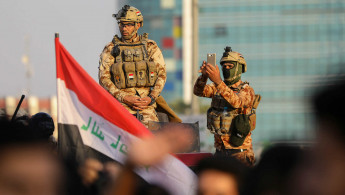Govt campaign of violence and intimidation sows fear among Iraq protesters
However a wider campaign of fear and intimidation is taking hold across the country, driving numbers down at rallies as activists, medics and their families are swept up in mass arrest campaigns, intimidated on the street, in their homes, in hospitals and online.
Meanwhile the internet is cut off at regular intervals, in what cybersecurity NGO Netblocks calls “curfew-like information controls”. Activists argue that internet blackouts are imposed ahead of the government round-ups of protesters in which they may deploy brutal force.
The southern province of Dhi Qar has become a flashpoint for the continuing protests, with hundreds waging sit-ins and blocking key bridges in the city of Nasiriyah. However a large number of security forces have subsequently been deployed to the area, setting up checkpoints to break up the gathering crowds and using live ammunition and military-grade tear gas grenades in an attempt to disperse protesters.
A funeral for protesters killed on Sunday night in Dhi Qar held the following evening sparked renewed rallies in which the four protesters were shot dead by security forces.
Meanwhile the authorities are undertaking mass arrest campaigns, reportedly combing hospital beds for injured protesters, and sending masked men to activists’ family homes to demand information on them.
Twitter Post
|
Activists also report being threatened online and pressured to give information on their friends, while men have been turning up at demonstrations to take pictures of groups of protesters before leaving.
This has led to many wounded protesters unable to go to hospitals for fear of surveillance or arrest.
Security forces are even forcing families to sign forms confirming their sons deaths were accidental in order to collect their bodies from morgues, according to analyst Rasha al-Aqeedi.
Meanwhile the prime minister’s office has prohibited hospitals and morgues from sharing casualty figures with other organisations.
The death toll from the protesters is thought to have reached 325, with a staggering 15,000 injured.
Medics in hospitals and volunteering at demonstrations have also been threatened into giving information on protesters, some having been fired or even arrested for treating wounded protestors.
The campaign comes after the abduction of doctor Saba Mahdawi, who was seized by armed men driving a pick-up truck as she walked home from Tahrir Square where she had been assisting people injured in the demonstrations.




 Follow the Middle East's top stories in English at The New Arab on Google News
Follow the Middle East's top stories in English at The New Arab on Google News

![A group of Palestinians, foreign and Israeli activists gather to participated in an olive picking event on the land in the town of Battir, which is under threat of confiscation by Israel in Bethlehem, occupied West Bank on 8 November 2024. [Getty]](/sites/default/files/styles/image_330x185/public/2182930803.jpeg?h=199d8c1f&itok=__0LgGsa)
